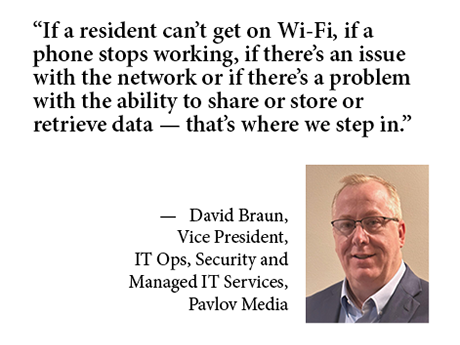The multifamily industry has its hands full: finance in adverse economic conditions, rapidly rising operation costs, as well as the challenge of attracting and keeping quality tenants as the biggest jump in new inventory creates more competition than the industry has seen in decades.
Technology is an enabling and defining tool in the midst of these challenges. Tenants often expect services like internet access, telephone, television and Wi-Fi hotspots throughout a complex. Multifamily property staff need data access, speciality software, as well as the ability to schedule prospective resident visits, remote viewing, maintenance and more.
Relatively few multifamily operations have the scope, scale and economics for an IT staff that can handle the support and repair requirements necessary to install systems, keep them working, protect data and networks while assisting tenant and staff users, particulary 24 hours a day, 7 days a week.
Managed IT services are third-party companies that remotely provide the IT expertise and the help a company requires. “If a resident can’t get on Wi-Fi, if a phone stops working, if there’s an issue with the network or if there’s a problem with the ability to share or store or retrieve data — that’s where we step in,” says David Braun, Pavlov Media’s vice president of IT ops, security and managed IT services.
Whether for apartment buildings, student housing or seniors housing communities, managed tech and IT services can be a business saver. A managed IT services arrangement means that a third-party company delivers a range of capabilities, including networking, Wi-Fi, television, telephones, security, server maintenance, fiber data connectivity and more for residents and operations staff.
“It’s absolutely critical to the multi-dwelling unit (MDU) business to be able to take care of the essentials quickly and easily. This includes Wi-Fi and television access for residents; incoming and outgoing calls; Internet access for registration, appointment scheduling or viewing apartments or rooms; scheduling staff meetings with a potential renter; and the ability to print from a computer over a network,” says Braun.
How to Find the Right Technology Management Fit
When considering a managed service provider, sharp questioning in advance is critical. First, ask what services the provider offers — is it only connectivity? Or does the provider offer connectivity services and managed IT services together? Not all providers and services may be able to do everything a multifamily property needs in every location. One provider might be particularly good in a needed area but less so in another.
The best solution could be to contract portions of the work to different vendors. “Some of our managed services customers use other fiber providers or even other Internet service providers because certain properties are locked into contracts with companies that cannot provide IT services.”
Braun explains that customers should be analytical and ask, “Is this the right provider for my property needs? A company may be the best provider of service A, but perhaps you also need service B. Can they do both? If they can’t, what is your appetite for having multiple providers?” Also, consider that working with multiple providers can complicate communications and create inefficiencies.
“It is important to know what kind of service your provider offers and what level of response they are willing to give you based upon the contract that you sign with them,” says Braun. Ask whether the company provides their own services or if they use a third party. Ideally you want a single point of contact for questions, discussions and issues. “You don’t want them to push you off to someone else.”
Finally, ask what other terms, conditions and options might be covered by the contract. “We work with clients and help them understand so they can rein in the support that they need into a digestible contract,” he says. If a provider can’t make these contract stipulations clear, you might be on the hook for more than you’re thinking.
Keeping Multifamily Business Running Smoothly
In turn, the managed service provider must have support contracts with its software and hardware vendors, to ensure that there’s a fix for every problem. “If our engineers are unable to solve the issue, we either have spare equipment that can be used to replace components or we have support contracts with vendors. We can bring that third-party vendor into the call as well and escalated up if the issue is not something that our engineers can resolve,” says Braun.
Another requirement for modern multifamily tech services is cybersecurity to protect staff and residents. Digital safety involves painstaking and tediously regular work like applying software updates to networks, servers and even security cameras in common areas. IT experts have to monitor systems for signs of cybercriminals attempting to access data. Managed tech professionals must then implement immediate safety measures and fixes.
Local Support and Expertise
Providers can solve many problems remotely but not all. If a piece of hardware fails, either someone on staff at the property must know how to fix it or the managed service provider needs personnel within reach to repair the problem.
Ensuring success requires knowing how long a provider has been in business, as well as how knowledgeable they are about the area they are serving. “Our clients ask themselves, is this provider a newcomer into the market, perhaps a company unfamiliar with the local landscape, laws or logistics?” Braun says. “Or are they like Pavlov Media, where we’re almost 30 years into the market?” You probably want a provider with experience and not a learning curve you’ll have to underwrite.
— By Erik Sherman. This article was written in conjunction with Pavlov Media, a content partner of REBusinessOnline. For more information on Pavlov Media, click here.


